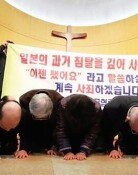No preparation for 50-trillion-won cash handout pledge
No preparation for 50-trillion-won cash handout pledge
Posted November. 30, 2021 07:27,
Updated November. 30, 2021 07:27
“There is no need to delay it until then,” said ruling Democratic Party (DP) presidential candidate Lee Jae-myung, mentioning the main opposition People Power Party (PPP) presidential candidate Yoon Seok-youl’s pledge to inject 50 trillion won to help small business owners and the self-employed hit by the COVID-19 pandemic. Lee said he is willing to take Yoon’s proposal, proposing that the plan be implemented right away. Yoon said the proposal is “desirable,” adding Lee seems to have realized the necessity of the plan belatedly since he had earlier criticized it as “populism.”
Early this month, Yoon made a pledge to inject 50 trillion won throughout the first 100 days of his administration to compensate small business owners and the self-employed strained by the cut in business hours during the pandemic. In response, Lee made an alternative proposal, saying it will not be a loss to Yoon if they include the 50 trillion won budget in next year’s main budget and execute it in advance. Lee agreed with Yoon’s cash handout pledge about ten days after his proposal to dole out additional universal cash handouts, using the 19 trillion won in excess tax revenue, was cancelled due to government’s objection.
Yoon’s plan would use 8.3 percent of next year’s government budget of 604.4 trillion won but he is not explaining how he would raise the funds for his pledge. This is why the pledge, along with Lee’s universal basic income pledge, which requires 20 trillion won to 59 trillion won a year, is being criticized as a populist policy. Even if Lee and the ruling party agree, it is almost impossible to increase the budget since the ruling and the opposition parties have failed to narrow their differences over Lee’s proposal to increase the budget for local currencies, and the government would not agree with an increase in the budget. They will give small business owners, who are facing difficulties again due to the resurgence of COVID-19 and the emergence of a new COVID-19 variant, Omicron, false expectations and eventually disappoint them.
Nevertheless, Lee’s agreement seems to be a political move that takes into account the benefits of creating a positive image of himself, who accepts the opposition party’s proposal if it is for the people, and the fact that it is the opposition party which will have to take responsibility in case the budget is not increased. To see Yoon welcoming Lee’s agreement as a “desirable” move, one cannot help but lament that there is no difference between the ruling and opposition parties when it comes to populism.
Both Yoon and Lee are irresponsible in that the former is not explaining how he would raise the fund for his 50-trillion-won cash handout pledge, whether by cutting down other budgets or by issuing bonds, and the latter is accepting Yoon’s idea two days before the legal deadlines for budget’s passage. It will also be difficult for the National Assembly, which should strictly monitor government spending amid unpredictable economic conditions at home and abroad, to avoid criticism that it hampered fiscal stability by being swayed by the words of presidential candidates.







